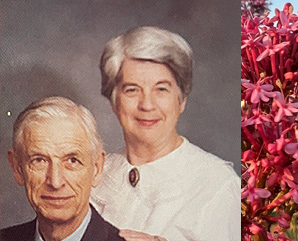
Beverley McMurray | The Morganton Years
Bob was ushering in church one Sunday, and Beverley was sitting in her usual seat against the back wall of the Narthex. Beverley turned to him and asked, “Do you think I’m odd?” Rather than answering right away, Bob walked to the other end of the Narthex to pick up more bulletins and then returned with his answer, “Damn right!” The next time Bob passed by, Beverley said, “I like you; you’re honest.” Bob and Beverley became fast friends.
Beverley came out of Virginia and had the accent to match. She had attended Wheaton College and told stories of Ruth Bell Graham. She married a lawyer who attended the living room meetings that I had with Beverley from his oil-painted perch above the fireplace. He was a striking-eyed, elegant man who seemed happy to see me every time I entered the room. Beverley spoke of him and to him, while I sat in the room and listened.
Beverley wasn’t some overly planted, soft petaled impatient or a southern steel magnolia. She was the odd flower that I so enjoyed. Her theology wasn’t Billy Graham’s, but more like Mark Twain’s. She had her share of anxieties. She liked to tell stories and delighted in her eccentricities. She would tell of her childhood days. A Dutch cleric came to dinner and asked the family to sing Psalm 121 as a blessing. “It’s the traveler’s Psalm,” said the cleric, which asks for God’s blessing on “our going out and our coming in from this time forth and forevermore.” Beverley was an artist and found her “help” in lifting her eyes unto mountain landscapes. Morganton was the perfect setting. However, she didn’t paint the Great Blue Ridge, but preferred the more neighborly South Mountain landscapes or as Beverley would say in her Virginia accent “the Sueth Mountains.”
She painted rolling scenes with men sitting in rocking chairs outside of gas stations or a woman in the back of a pickup truck. This reminds me that she had an old brown Chevy pickup that she would drive along Burke County backroads in hopes of stumbling upon a suitable scene to paint. Often she would come into my office to tell me the story of her day – how she drove up a driveway and met an old man with one leg or how she drove into a field that turned out to be a practice range. “For golf balls?” I asked. “Bullets,” she replied, “I think I was too big and too slow, so a gentleman politely asked me to get off the range. I complied!”
One day she came into my office and said, “Do you think God minds if I swear at him?” I replied, “I think God is big enough to handle it.” So there in my office she let him have it! “Beverley,” I said, “what’s up?” “Son John has been diagnosed with cancer. Donovan, I lost my husband to cancer, and it about killed me. Now John’s got it.” Beverley wept.
As a pastor, I note when people come back to worship after long absences. “Something must be up,” I think to myself. However, Beverley had a life full of gold stars in Sunday worship attendance, albeit from her seat in the Narthex, but she was faithful. When her son was diagnosed, Beverley stepped up her attendance to every day. I’d find her in the Parlor asleep on the sofa or in the Chapel asleep in a pew. I suspected that nights were hard for her.
John fought well for a while, but in the end his service was held in a large and packed-to-the-gills Methodist church in Charlotte. A life well-lived, and the community knew it.
After John’s death, Beverley came into my office looking a bit washed out. I listened. The next Sunday Beverley was, of all places, in the Sanctuary. I spotted her singing a hymn. I wept. The woman who had the faith to swear at God also had the faith to reconcile all things and sing.
The oil painting “Sueth Mountains” hangs in our bedroom and greets me every morning. “I lift up my eyes unto the hills, from whence cometh my help. My help cometh from the Lord, which hath made heaven and earth.”